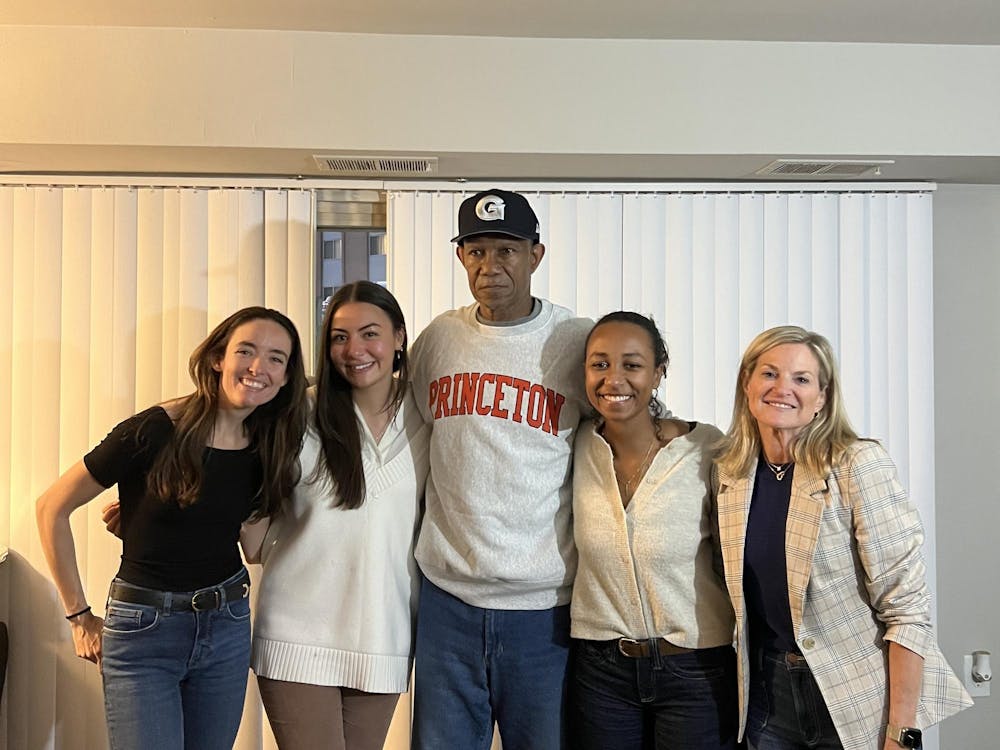When Anthony “Tony” Mills returned home to his family on Friday, Oct. 25 after 17 years in prison, he was surprised to find a whole party waiting for him. He’d expected to get to his niece’s house in Maryland around noon, but schedules can be unpredictable when you have ankle monitor orientation and a corrections officer escorting you home. He didn’t end up arriving until 5 p.m.
“When I did get here at 5 o’clock and walk through the door, they were here, so I was surprised about that, and I was happy as well to see all of them,” he said. “At the same token, it was a bittersweet moment for me, because I shouldn’t have ever been incarcerated.”
Mills is the second person in less than two years to be freed while participating in Princeton’s “Making an Exoneree” program, a semester-long class that tasks undergraduates with reinvestigating cases of people who have been wrongfully incarcerated and fighting for their release.
Incarcerated for 17 years after being convicted for robbery, burglary, and assault, Mills has maintained that he never committed the crime. Phone records show that he was on a call with his employer during the time the crime was reported to have taken place, and experts have found numerous issues with the police investigation which led to his conviction. This spring, when Making an Exoneree took on his case, Mills had another 17 years left in his sentence.
The program, which began at Georgetown University in 2018 and established a partner course at Princeton’s School of Public and International Affairs (SPIA) in 2023, is often a last resort for people who have exhausted all other legal options.
“Typically, these people have had counsel and representation in the past, and their appeals haven’t gone super well for whatever reason,” said Clara McWeeny ’25, who took the course in 2023 and returned as a teaching assistant the following year.
The students in the course built on work Mills had done throughout his sentence.
“I had the Princeton students, I had Georgetown students, I had an exoneration team. And they were my voice,” Mills said.
After being selected for the program, Mills was matched with Milica Maricic ’25, J.J. Scott ’24, and Alaa Omer ’25, along with Georgetown Law student Miranda Card Lampke. He was up for parole, so much of their work involved working with him to put together a re-entry plan and prepare for his parole hearing.
Over the course of the semester, the students spent countless hours not just working on the case, but also getting to know Mills.
“Tony is probably the most nurturing person I've ever met in my life,” Scott said. “It felt like I found yet another father figure in life.”
Those involved in Making an Exoneree cases don’t typically expect a release as a given, especially so soon after someone begins as a participant. “We were on pins and needles whether or not the parole board was even going to give me parole,” Mills said of his case.

He was approved for parole in June, and is now on house arrest until late January.
Scott commented that his homecoming was particularly special because he got to meet his great nephew, Kingston, for the first time. “He and Tony have the same exact smile,” she said, “and so that was amazing to see, and just getting to witness the love between them and being able to be a part of their reunion was probably one of the most special moments of my life.”
She also noted the unusual experience of participating in a class like Making an Exoneree. “It was such a special experience, especially at Princeton, where there’s not too many opportunities to feel like the classes you’re taking really have a direct, tangible effect on someone else’s life.”
Lecturer Maya Dimant, who taught the course in the spring, also commended the University. “I feel really proud and grateful that Princeton, and SPIA in particular, have seen the importance of exposing students to this kind of work and giving them a platform for raising engagement with these issues in real ways,” she said.
After just two iterations of the course, Mills joins a growing group of people released from prison after participating in Princeton’s program. Muti Ajamu-Osagboro was released in June 2023, and a third person, Ivery Dorsey, is set to get out of prison soon.
SPIA Senior Associate Dean Paul Lipton did not respond to a request for comment about whether the course will be offered again in some form this spring.
Maricic said these releases are evidence that the program “is working, and students are passionate about this, and they care so much about it that the momentum needs to continue.”
Correction: a previous version of this article incorrectly referred to Maya Dimant as a professor. The ‘Prince’ regrets this error.
Annie Rupertus is a head News editor for the ‘Prince’ from Philadelphia, Pa. who often covers activism and campus governance.
Please send any corrections to corrections[at]dailyprincetonian.com.








